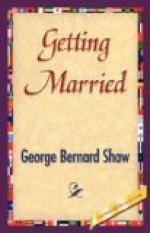What they called patriotism was a conviction that because they were born in Tooting or Camberwell, they were the natural superiors of Beethoven, of Rodin, of Ibsen, of Tolstoy and all other benighted foreigners. Those of them who did not think it wrong to go to the theatre liked above everything a play in which the hero was called Dick; was continually fingering a briar pipe; and, after being overwhelmed with admiration and affection through three acts, was finally rewarded with the legal possession of a pretty heroine’s person on the strength of a staggering lack of virtue. Indeed their only conception of the meaning of the word virtue was abstention from stealing other men’s wives or from refusing to marry their daughters.
As to law, religion, ethics, and constitutional government, any counterfeit could impose on them. Any atheist could pass himself off on them as a bishop, any anarchist as a judge, any despot as a Whig, any sentimental socialist as a Tory, any philtre-monger or witch-finder as a man of science, any phrase-maker as a statesman. Those who did not believe the story of Jonah and the great fish were all the readier to believe that metals can be transmuted and all diseases cured by radium, and that men can live for two hundred years by drinking sour milk. Even these credulities involved too severe an intellectual effort for many of them: it was easier to grin and believe nothing. They maintained their respect for themselves by “playing the game” (that is, doing what everybody else did), and by being good judges of hats, ties, dogs, pipes, cricket, gardens, flowers, and the like. They were capable of discussing each other’s solvency and respectability with some shrewdness, and could carry out quite complicated systems of paying visits and “knowing” one another. They felt a little vulgar when they spent a day at Margate, and quite distinguished and travelled when they spent it at Boulogne. They were, except as to their clothes, “not particular”: that is, they could put up with ugly sights and sounds, unhealthy smells, and inconvenient houses, with inhuman apathy and callousness. They had, as to adults, a theory that human nature is so poor that it is useless to try to make the world any better, whilst as to children they believed that if they were only sufficiently lectured and whipped, they could be brought to a state of moral perfection such as no fanatic has ever ascribed to his deity. Though they were not intentionally malicious, they practised the most appalling cruelties from mere thoughtlessness, thinking nothing of imprisoning men and women for periods up to twenty years for breaking into their houses; of treating their children as wild beasts to be tamed by a system of blows and imprisonment which they called education; and of keeping pianos in their houses, not for musical purposes, but to torment their daughters with a senseless stupidity that would have revolted an inquisitor.
In short, dear reader, they were very like you and me. I could fill a hundred pages with the tale of our imbecilities and still leave much untold; but what I have set down here haphazard is enough to condemn the system that produced us. The corner stone of that system was the family and the institution of marriage as we have it to-day in England.




